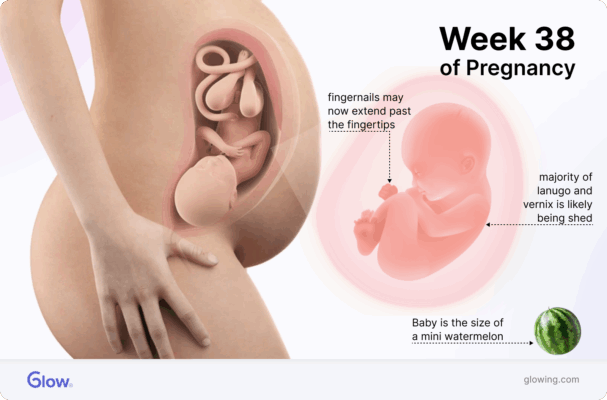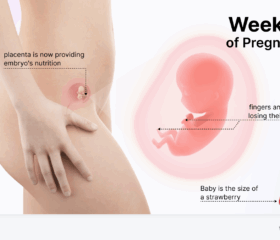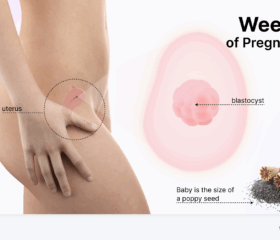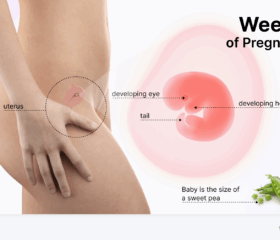Pregnancy Week by Week
38 Weeks Pregnant
Your baby is as big as a small watermelon.
19.5
inches
6.75
pounds
- 38 Weeks Pregnant: Your Symptoms, Milestones, and Preparing for Your Baby’s Arrival
- Your baby’s development at 38 weeks
- Your body’s condition at 38 weeks
- When should you call your doctor?
- How to recognize the signs of early labor
- Tips for staying comfortable in week 38
- Preparing for delivery and beyond
- Final thoughts
38 Weeks Pregnant: Your Symptoms, Milestones, and Preparing for Your Baby’s Arrival
This is an exciting time that you’ll probably cherish for the rest of your life. Of course, it’s also normal to feel a bit nervous about the upcoming birth of your baby.
You presumably want to be as prepared as you can. Read on to find out what your baby’s up to, what pregnancy symptoms are common in week 38, and what preparations you should make for the post-birth period.
Your baby’s development at 38 weeks
At 38 weeks, your baby is putting the finishing touches on her preparations for life outside your womb. For instance, her lungs might still be maturing—even though she’s already just about ready to start breathing real air. 1
Here are some particularly notable developmental milestones at week 38:
- Size: Your baby is now around 19½ inches and weighs 6¾ pounds (3.06 kg). 2
- Nail growth: Her fingernails and toenails are fully formed. In fact, her fingernails may extend beyond her fingertips by this point.
- Body fat: Her body is still adding fat, which helps regulate her body temperature and creates those adorable, chubby cheeks everyone will be cooing over soon.
- Shedding: She’s shedding most of her lanugo (the fine baby hair covering her body) and vernix caseosa (the white, waxy coating protecting her skin). It’s normal to see some of this come out during childbirth.
- First bowel movement: Your baby is also swallowing amniotic fluid. Some of the cast-off cells and waste in the fluid may end up in her intestines and turn into meconium—her first poop. 3
As your baby drops lower in your uterus to get ready for birth, you’ll feel an increased pressure in your pelvis and less pressure on your lungs. As a result, you can breathe a bit easier, although this might come with an accompanying (and annoying) urge to urinate.
Ideally, your baby’s head is facing down at this point. If not, your doctor will try to turn her; if that doesn’t work, you might need a C-section, since it isn’t safe for babies to come out feet-first.

Your body’s condition at 38 weeks
This might be the most exciting time of your pregnancy. You’re just a few weeks away from finally holding your baby’s hand.
However, you’re not alone if excitement is warring with exhaustion. You may still be dealing with several troublesome pregnancy symptoms, such as:
- Swollen ankles and feet: Some edema (fluid retention and swelling) is still normal at this stage. However, while it’s normal to experience swollen feet during pregnancy, watch out for sudden or excessive swelling, which requires immediate medical attention.
- Trouble sleeping: Many expectant moms have difficulty sleeping at night during their late pregnancies and take more daytime naps as a result.
- Intense dreams: It’s common to experience more vivid or unusual dreams during this period due to hormone fluctuations and anxiety about labor.
- Lightning crotch: This is a feeling of sudden, sharp pain in your pelvis or groin. It happens when your baby’s head pushes against the nerves in your pelvis.
- Pregnancy discharge: You may see an increase in your vaginal discharge.
- Heartburn and indigestion: Your baby is taking up more space than ever in your uterus, which is great—it means she’s getting big! The downside is you may have more intense heartburn and indigestion.
- Braxton Hicks contractions: You’re probably more than familiar with these “practice” contractions by now, but they may grow more intense or frequent in your 38th week.
Other potential symptoms include an itchy belly and leaky breasts. Note that not every expectant mom will experience leaking, and if you don’t, it doesn’t mean there’s a problem; you’ll still be able to breastfeed just fine.
When should you call your doctor?
Having mild late pregnancy symptoms is normal, but you should call your doctor if you have:
- Sudden or excessive swelling in your feet, ankles, or face
- Severe headaches
- Vision changes
- Heavy vaginal bleeding
- Green, yellow, or foul-smelling discharge
- Decreased fetal movement
- A rush of fluid that’s more copious than normal vaginal discharge (your water breaking)
- Regular, painful contractions
All of those suggest potential pregnancy complications, which you’ll need medical attention for.
In particular, the last two points are signs of early labor. We’ll go over other signs that may come with an early birth and explain how you can tell whether you’re having “real” labor contractions in the next section.
How to recognize the signs of early labor
Unless your due date is wrong (e.g., you used a due date calculator incorrectly), you’re still a few weeks away from your due date. However, it’s possible to go into labor prematurely, so watch out for these signs of labor:
- Mucus plug and bloody show: When your labor is near, you may notice mucus and bloody show (streaks of blood) on your underwear or toilet paper. That’s because your cervix is dilating and releasing the mucus plug that protected it during your pregnancy. 4 Seeing blood like this is normal and not cause for alarm, but it does mean your baby will be coming in the next few days.
- Diarrhea or nausea: As your labor nears, the hormones that cause your uterus to contract may also lead to diarrhea. Some women will have feelings of nausea as well—a little throwback to the first trimester. 5
- Back pain: Sudden and intense lower back pain during your pregnancy may also be a sign of labor. 5
- Contractions: As mentioned, one key sign of labor is when your contractions become more frequent and intense.
- Water breaking: This is the most telltale sign of all. Your amniotic sac rupturing, known as your “water breaking,” is a clear sign that you’re in labor (or soon will be).
Practice contractions vs. real labor contractions
As you already know, Braxton Hicks contractions are “practice” contractions that occur irregularly, often starting early in the third trimester. Some women barely feel them at all, while others get them relatively often. They’ll usually feel like a tightness in your belly that goes away when you change positions or rest for a while.
By contrast, real labor contractions feel painful, occur regularly, and last longer. These contractions are no joke. You might feel pain radiating through your sides and thighs, and you may even have a hard time walking or talking through it. 6
If you think real labor contractions have kicked in, time them and note their duration with a pregnancy tracker app. It’s time to head to the hospital when your contractions are 5–10 minutes apart and last 60–90 seconds each. 7
Tips for staying comfortable in week 38
Follow these tips to stay comfy during this final stage of your pregnancy:
- Drink a lot of water; your hydration is more important than ever.
- Elevate your feet when you’re resting to reduce swelling and improve your circulation.
- Wear loose, comfortable clothing made from breathable fabrics.
- Do light exercise, like walking around your neighborhood, but don’t push yourself too hard.
- Eat smaller, more frequent meals rather than a few big ones, so that your heartburn and indigestion don’t get any worse.
- Do breathing exercises and practice meditation to help you relax. These are also good techniques to manage labor pain later on.
- Apply moisturizing cream on your belly so it doesn’t itch as much. (Ask your doctor for suggestions if you aren’t sure which brand to use.)
- Use a belly band to support your lower back and abdomen.
Just as importantly, do your best to think positive, even if you’re more than a little physically uncomfortable.
Hopefully, just thinking about meeting your little one soon will keep you in a good mood. That’s great, as happiness leads to good health (for everyone, not just for expectant moms). Keep it up!
Preparing for delivery and beyond
As you move toward bringing your newborn baby into the world, you have some preparations you need to get squared away:
Double-check your hospital bag
Check again that you’ve packed everything you need for labor, delivery, and your postpartum period in your hospital bag. This includes hospital documents, comfortable clothes, toiletries, and snacks.
Even if you packed weeks ago, check what you picked, paying particular attention to your clothes. As your baby’s grown, your body has changed along with her. There might be clothes that you selected a few weeks ago that are now a bit tight. If so, swap them for new ones that fit better.
Stock up on postpartum supplies
The first few weeks of having your baby are magical. However, she’ll also keep you busy—very busy. It’s a good idea to buy postpartum supplies like pads, nursing bras, and comfortable underwear before you give birth.
If you have someone that can cook for you during those first few weeks, that’s great, but not everyone has that extra helping hand. If your family and friends aren’t around, doing meal prep beforehand can make your life with a newborn much easier.
Prepare freezer-friendly meals like burritos, casseroles, bread, muffins, and soup. Divide them into small portions and label them. If you’re not much of a cook, there are many blogs with healthy postpartum meal recipes you can look up.
If you don’t have the time to do meal prep, search for postpartum meal services near you. Compare their meals and prices so you get the best bang for your buck.
Plan for baby feeding
If you can’t (or don’t want to) breastfeed, feeding your baby formula (or a combination of both) is fine. Whichever method you choose, you need to know how to do it properly.
Research how to breastfeed or bottle-feed and what equipment you need. For instance, you may need breast pumps, nursing covers, nursing pillows, breastfeeding bras, breast milk storage bags, and baby bottles.
Learn about newborn screening
Every US state offers newborn screening to test babies for health problems. They’ll usually administer a blood test within a few days of her birth (they’ll get the blood sample from her heel). 8
The hospital will typically also conduct a hearing test on your baby before she leaves the hospital. If they don’t, you’ll need to make an appointment for her within a month of her birth. 9
You don’t have to worry or prepare for these tests. Just bear in mind that they’ll happen soon after your baby is born.
Final thoughts
Enjoy these last few weeks with your baby still in your belly. You’re doing a great job, so just keep trusting your instincts and listening to your body, and call your doctor if you have any questions or concerns.
Get some rest, relax, and get ready to welcome your baby into the world!
Article Sources
- The Texas Advanced Computing Center. "A Newborn's Lung" Retrieved June 26, 2025.
- Alabama Cooperative Extension System. "Moms to Be: From Seed to Melon" Retrieved June 26, 2025.
- MedlinePlus. "Meconium" Retrieved June 26, 2025.
- Mayo Clinic. "Labor and delivery, postpartum care" Retrieved June 26, 2025.
- USF Health. "Preterm Labor" Retrieved June 26, 2025.
- Cleveland Clinic. "Braxton Hicks Contractions" Retrieved June 26, 2025.
- MedlinePlus. "Am I in labor?" Retrieved June 26, 2025.
- U.S. Centers for Disease Control and Prevention. "About Newborn Screening" Retrieved June 26, 2025.
- National Institute on Deafness and Other Communication Disorders. "Your Baby's Hearing Screening and Next Steps" Retrieved June 26, 2025.







